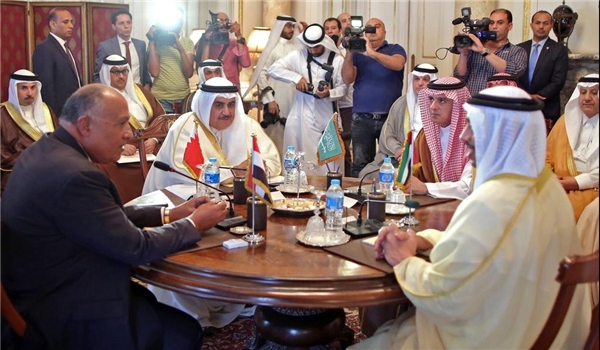
RNA - High-ranking officials of Riyadh, Abu Dhabi, Manama and Cairo reiterated their positions on the PGCC crisis, condemning Qatar what the four Arab states perceive as Doha's support for armed groups, while the small Persian Gulf country has repeatedly denied the allegations.
"The four countries are ready for dialogue with Qatar provided that it states sincere willingness to stop funding terrorism and extremism as well as its commitment to avoid interference in other countries' foreign affairs and respond to the 13 demands," Bahrain's Foreign Minister Sheikh Khalid bin Ahmed al-Khalifa said on Sunday after a meeting with his Saudi, Emirati and Egyptian counterparts.
However, Saudi Foreign Minister Adel al-Jubeir refused to negotiate the list of 13 demands on Qatar - extended from an earlier list of six.
"(Qataris) speak of every issue except how to put an end to their support for terrorism," Jubeir said, accusing Qatar of not being "genuine".
"These demands are not negotiable. We cannot shrink (the list) down," he added.
Also, the Saudi top diplomat once again deplored close ties between Iran and Qatar, stressing that Doha is inflicted with miscalculations.
The televised news conference in Manama comes more than one month after the Saudi-led bloc cut diplomatic ties with Doha and imposed a land, sea and air blockade on Qatar.
The Emir of Qatar Sheikh Tamim bin Hamad Al Thani has recently described the recent blockade by a Saudi-led group of Arab countries against Qatar as "pre-planned campaign", adding that Doha is ready for dialogue to resolve a diplomatic crisis with Arab states.
Qatari Foreign Minister has also announced that the small Persian Gulf emirate was willing to hold constructive talks with Arab rivals if they stopped meddling in its home affairs.
Bahrain, Saudi Arabia, the United Arab Emirates and Egypt cut off diplomatic ties with Qatar early June, and suspended air and sea communication one week after the Arab Islamic American Summit in Riyadh, accusing Doha of supporting terrorist organizations and destabilizing the situation in the Middle East.
Qatar rejected claims by a Saudi-led bloc of countries that it “finances terrorism” and intervenes in their internal affairs.
After more than two weeks, on June 22, the Saudi-led bloc gave Qatar a 10 days to comply with 13 demands, which included shutting down the Al-Jazeera Media Network, closing a Turkish military base and scaling down ties with Iran.
Through Kuwait, which has been acting as intermediary, Qatar officially responded to the new deadline, as Doha stressed that the demands by Saudi Arabia and its allies were impossible to meet.
Foreign Ministers from the bloc of countries boycotting Qatar released a statement, saying Doha’s rejection of the demands “proved” its link with terrorism. Top diplomats of the boycotting countries also added that the list of the collective demands was now void and they pledged further political, economic, and legal steps against Qatar.
Qatar had announced that Doha would not meet any of the 13 demands made by Saudi Arabia and its allies, offering instead "a proper condition for a dialogue" to resolve the [Persian] Gulf crisis, accused Saudi Arabia and its regional allies of "demanding that we must surrender our sovereignty as the price for ending the siege".
But Riyadh reiterated that its demands to Qatar to end the stand-off in the [Persian] Gulf were "non-negotiable".
Qatar is supported by Turkey and Iran as Ankara and Tehran have stepped in to provide fresh produce, poultry and dairy products to Doha, while Russia stressed that Moscow would do "everything possible" to help resolve the crisis. The US, UK and other Western countries have also dispatched senior envoys to the region to press both sides to resolve the dispute.
The split among the Arab states erupted last month after US President Donald Trump visited Riyadh where he accused Iran of "destabilizing interventions" in Arab lands.
847/940